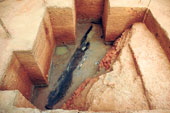Signs
of ancient port in Kerala
- Pattanam mentioned in
Indian & Greek texts
G.S. MUDUR

An
ancient wooden canoe at the Pattanam site
New Delhi, Aug. 2: A village
in Kerala’s Periyar delta may be the site of a port that has remained untraced
for centuries although ancient Indian and Greek texts had described it as an Indian
Ocean trade hub, researchers have said.
Archaeological excavations at Pattanam,
about 25km north of Kochi, have yielded an abundance of artefacts — a 2,000-year-old
brick-layered wharf, a wooden canoe and hundreds of fragments of Roman and West
Asian pottery, including wine jars.
The findings of three years of excavations
suggest that the Pattanam site may have been part of Muziris, a port city mentioned
in an ancient Tamil text, Akanunuru, as well as in the Periplus of the Erythraean
Sea, a navigational guide from ancient Greece describing ports along the Red Sea
and in India. Historians have dated both texts to the first century AD.
“Pattanam
may be the oldest port with a large amount of evidence of Roman contacts outside
the traditional boundaries of the Roman empire,” said Parayil John Cherian,
the director of the Kerala Council of Historical Research and research team leader.
Cherian and his colleagues have published their findings in the latest
issue of Current Science, a peer-reviewed journal published by the Indian Academy
of Sciences. “The artefacts suggest this was a major trading port,”
Cherian told The Telegraph.
The excavations revealed a six-metre-long wooden
canoe, a wharf with wooden bollards to hold boats and fragments of Roman pottery
that appear to contain material from southern Italy as well as shards of Egyptian
and Mesopotamian pottery. Scattered alongside in a waterlogged area near the wharf
were grains of black pepper, cardamom and rice.
The researchers said the
findings provide strong circumstantial evidence that Pattanam was part of the
port of Muziris because they match descriptions of the ancient port in Tamil literature
from about the first century AD.
“The text mentions a port named Muchiri
where ships arrived with gold and jars of wine and returned with pepper,”
said Veerasamy Selvakumar, a team member from the department of epigraphy and
archaeology at Tamil University, Thanjavur.
“We now have evidence
for spice trade from this site, and the Roman Amphora fragments point to wine
jars,” Selvakumar said.
Scientists at the Institute of Physics in
Bhubaneswar who helped the archaeologists date some of the materials discovered
at the site found that wood from the wharf was about 2,000 years old — between
the first century BC and the first century AD.
The researchers believe
ships would sail from a port on Egypt’s Red Sea coast into the northern Indian
Ocean and into Muziris. “We’ve estimated that the voyage would have
taken about 70 days,” Cherian said.
He said the discovery of jars
from Mesopotamia and turquoise-glazed pottery from a layer at the archaeological
site where no Roman amphora was found suggests that some West Asians may have
predated contacts with the Romans.
The excavations suggest the site was
first occupied about 1,000 BC and remained active until about the 10th century
AD. During that period, it engaged in extensive trade with cultures from the Mediterranean,
West Asia and even Southeast Asia.